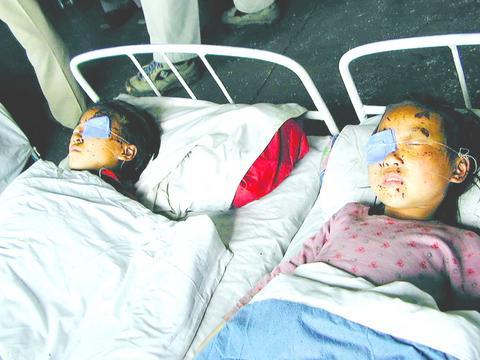Dozens of North Korean children who were badly burned or hit by debris during last week's train explosion are dying in pain because the ill-equipped hospital where they are being treated has been overwhelmed by casualties, it emerged on Sunday.
After the first visit by outsiders since the blast on Thursday, one international aid worker said the harrowing scenes inside the Sinuju hospital were among the worst he had seen in 20 years of humanitarian work.

PHOTO: AFP
The North Korean government said 161 people were killed in the disaster, which it blamed on human error. According to the state media, cargo wagons filled with oil and chemicals exploded when workers snagged the cars on power lines in a shunting yard.
Visitors to the Sinuju hospital were told the death toll is likely to rise because doctors lack medicines and the specialized equipment needed to treat burn patients.
Of the 360 people taken in for treatment, 15 have already died and 50 others are said to be in a critical condition. More than half of the victims are infants from a primary school that was devastated when the blast ripped through the town of Ryongchon.
"We saw about 40 of the wounded, most of whom were children with blast injuries," said Masood Hyder, the UN humanitarian coordinator in North Korea. "Basically, anyone who was looking in the direction of the explosion got [it] in the face."
Among the wounded were an 11-year-old boy, whose face had been ripped off, four children who had lost their sight and a comatose eight-year-old boy.
Even at the best of times, North Korea's dilapidated health system is unable to cope with normally treatable illnesses. After 10 years of famine, economic decline and government policies that devote all available resources to the military, most hospitals lack heating, running water, medicine, surgical tools and sterilizing equipment.
Aid workers said doctors in Sinuju hospital were over-run, the drips were antiquated and beds were in such short supply that injured children were having to lie on filing cabinets.
"It was one of the worst sights I have ever seen," said Richard Ragan, country director for the World Food Program. "You could hear the screams of children and it made you wonder whether there were any painkillers. The doctors are doing a heroic job, but they are overworked and under-resourced."
International aid is on its way. The World Food Program has provided food for the victims and the homeless; the Red Cross has distributed medicine, tents and blankets, and yesterday, the first convoy of about eight Chinese trucks drove across the border with instant noodles, bottles of mineral water and other relief supplies.
Japan, which has yet to establish diplomatic relations with Pyongyang, is said to have offered US$100,000 of emergency aid.
But visitors to the Sinuju hospital said specialized treatment would be needed to help the many people who have been blinded or badly burned.
"My sense is that they need supplies and technical expertise and they need it quickly," Ragan said.

VAGUE: The criteria of the amnesty remain unclear, but it would cover political violence from 1999 to today, and those convicted of murder or drug trafficking would not qualify Venezuelan Acting President Delcy Rodriguez on Friday announced an amnesty bill that could lead to the release of hundreds of prisoners, including opposition leaders, journalists and human rights activists detained for political reasons. The measure had long been sought by the US-backed opposition. It is the latest concession Rodriguez has made since taking the reins of the country on Jan. 3 after the brazen seizure of then-Venezuelan president Nicolas Maduro. Rodriguez told a gathering of justices, magistrates, ministers, military brass and other government leaders that the ruling party-controlled Venezuelan National Assembly would take up the bill with urgency. Rodriguez also announced the shutdown

Civil society leaders and members of a left-wing coalition yesterday filed impeachment complaints against Philippine Vice President Sara Duterte, restarting a process sidelined by the Supreme Court last year. Both cases accuse Duterte of misusing public funds during her term as education secretary, while one revives allegations that she threatened to assassinate former ally Philippine President Ferdinand Marcos Jr. The filings come on the same day that a committee in the House of Representatives was to begin hearings into impeachment complaints against Marcos, accused of corruption tied to a spiraling scandal over bogus flood control projects. Under the constitution, an impeachment by the

China executed 11 people linked to Myanmar criminal gangs, including “key members” of telecom scam operations, state media reported yesterday, as Beijing toughens its response to the sprawling, transnational industry. Fraud compounds where scammers lure Internet users into fake romantic relationships and cryptocurrency investments have flourished across Southeast Asia, including in Myanmar. Initially largely targeting Chinese speakers, the criminal groups behind the compounds have expanded operations into multiple languages to steal from victims around the world. Those conducting the scams are sometimes willing con artists, and other times trafficked foreign nationals forced to work. In the past few years, Beijing has stepped up cooperation

Exiled Tibetans began a unique global election yesterday for a government representing a homeland many have never seen, as part of a democratic exercise voters say carries great weight. From red-robed Buddhist monks in the snowy Himalayas, to political exiles in megacities across South Asia, to refugees in Australia, Europe and North America, voting takes place in 27 countries — but not China. “Elections ... show that the struggle for Tibet’s freedom and independence continues from generation to generation,” said candidate Gyaltsen Chokye, 33, who is based in the Indian hill-town of Dharamsala, headquarters of the government-in-exile, the Central Tibetan Administration (CTA). It